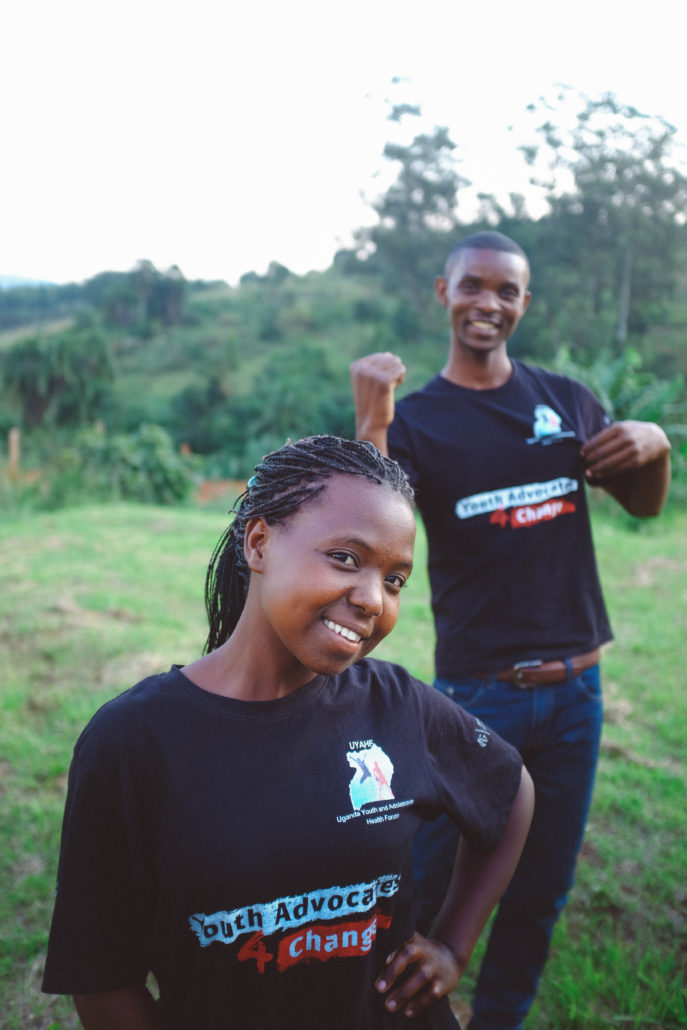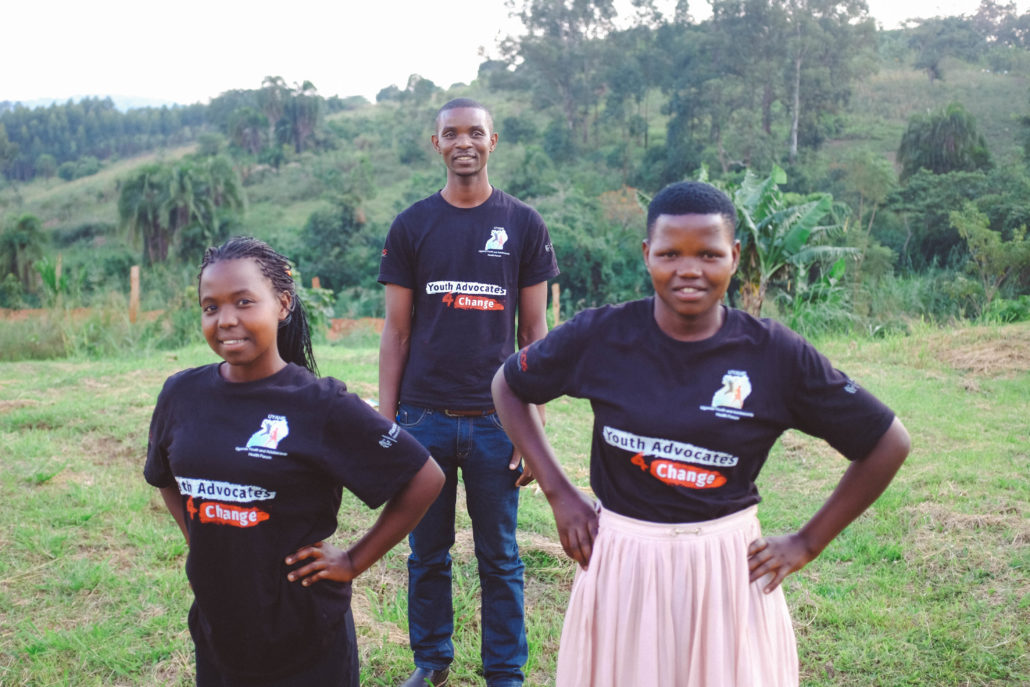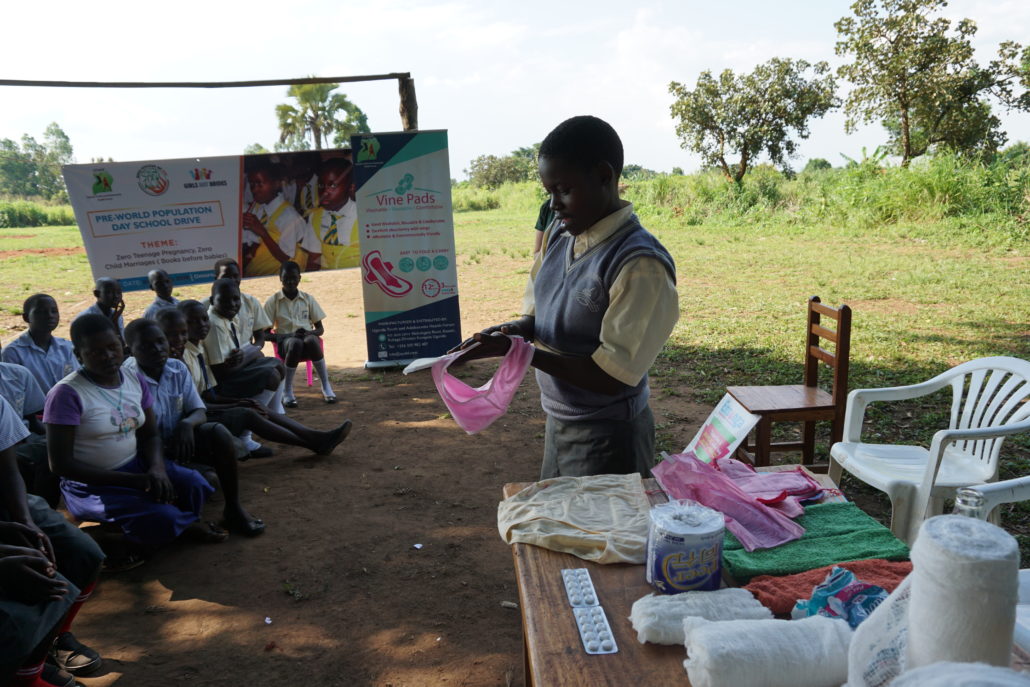UYAHF brought SRHR change to Uganda
Over the span of 5 years of CHanGE there was a special bond with the Ugandese youth organisation UYAHF (Uganda Youth and Adolescents Health Forum), who advocate for change in Uganda. By happening of an inspiring encounter in 2017, the CHanGE campaign of that year was formed to talk about menstrual hygiene management. Both UYAHF and CHanGE share the sense of engagement to support local youth to make progress for sexual and reproductive health and gender equality in their own communities.
In spite of difficulties to continue the cooperation due to the COVID-19 pandemic, a strong connection and continuation of cooperation remained, resulting in a youth project in a Ugandese refugee settlement in Uganda. Moreover, participants of CHanGE and other Belgian students were given the opportunity to get to know the advocacy group and also take up an internship there. This cooperation was made possible with support from Flanders Foreign Office (Vlaanderen Buitenlandse Zaken).
Youth Advocacy Champions for CHanGE
UYAHF is a youth-led and youth-serving organisation in Uganda that strengthens and amplifies the voices of youth when it comes to sexual and reproductive health and rights (SRHR) and gender equality. In the collaboration project with UCOS, it focused on child marriages and teenage pregnancies in refugee settlement Kyaka II and its surroundings. The project started in 2019 and ended in 2021. It had a great influence on both the local communities in which they operate as well on Uganda’s national plan to end child marriage and teenage pregnancies.
On a local activities level, UYAHF has created a team of 20 promising young people -so called Youth Advocacy Champions- out of the host and refugee communities, who were trained on SRHR, SGBV and how to increase involvement and participation of other people. They visited local schools, churches, youth centres and a health centre with community outreaches to increase their knowledge and awareness. Even during the COVID-19 pandemic, they continued their operations by going door-to-door, not only offering information on the virus, but also on SRHR and distributing condoms and oral contraception pills. Lastly, UHAYF has established a safe space in the village of Sweswe in which young people can come to relax, study or learn skills. Some of the equipment available are sewing machines and a piano.
Next to activities which directly impact and benefit the local communities, UYAHF and their Youth Advocacy Champions have conducted research on SRHR in regions in which they are active. They collected data on the experiences of their peers on SRHR, child marriage and teenage pregnancies. Based on the results, they convinced the Ugandan Office of the Prime Minister of the urgency of tackling child marriage and teenage pregnancies, and developed a framework and for Ugandan authorities. Consequently, UYAHF has received strong support from both local as the national governments for their activities. They are very proud of their achievements in carrying out an assessment and forming a framework in which the SRHR experiences of young Ugandan people are documented. The local government intends to follow up on the action plan and some of the Youth Advocacy Champions will proceed with their youth work even though the official project has ended.
Belgian students at UYAHF
Hanne Vindevogel completed an internship at UYAHF in 2020, as part of her postgraduate education in Sustainable Development. She would have spent 6 months of her internship in Uganda, but had to leave the country early due to the COVID-19 pandemic. “The short period in which I resided in Kampala was very educational and busy. I was involved in the organisation of activities, campaigns, the attendance of meetings, the writing of reports, research, participation of meetings with partners, events of UYAHF both in Kampala as well as elsewhere”, says Hanne. After her return to Belgium in the beginning of the pandemic, she was able to continue her internship digitally. After all, all activities were suddenly organised online. “The weekly team meetings could continue to take place, I was still able to help realise the alternative activities, and to map the impact of the lockdown on the lives of the youth and on SRHR. Besides that, UYAHF made a podcast that I recorded, moderated and edited. I had not done this before so this was a skill I could develop there. It was a major adaption, as for everyone, to conduct an internship completely digitally but we managed to adapt and the cooperation went smoothly until the end of my internship.”
Hanne thinks her internship improved her communication skills and self-awareness. “It also made me reflect a lot on the concept of an internship abroad, my role as a white intern, my positionality and on what I could and could not do.” Hanne concludes “it was very interesting to conduct the internship in two completely different settings. It was completely different yet luckily I could still continue the internship.”
Esther Philippen did her internship at UYAHF in 2019, before the COVID-19 pandemic. “I experienced what a trump card it can be to have a passion that you can convert into a professional or voluntary commitment. What strongly resonates with me is the enthusiasm and professionality of the people that worked at UYAHF as well as their volunteers. Everyone could tell inspiring stories about how to they are committed to gender and SRHR, each from their own perspective. Even during breaks or lunches with a rice stew with lentils (which I loved!), everyone talked eagerly about accessible SRHR services to youth.”
For Esther, it was eye-opening how plans changed alle the time and the flexibility of the UYAHF team was of major importance. “A school that does not respond to a workshop, a traffic stop in which you are stuck for a while, a boda boda that does not show up due to heavy rainfall,… These circumstances have an impact of how you can perform your work. The solution-oriented mindset and resilience of the workers of UHAYF are skills of which I most definitely learned something.”





